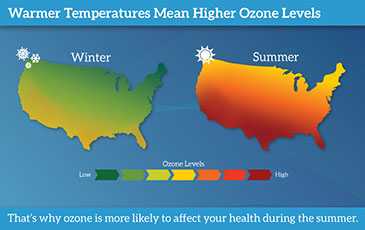Ozone and Your Health

Breathing in ground-level ozone can be harmful to your health.
How can ozone affect my health?
If you have asthma, bronchitis, or emphysema, ozone can make your symptoms worse. Carefully follow your asthma management plan on days when ozone levels are high.
Ozone has also been linked to:
- Coughing and pain when taking a deep breath
- Lung and throat irritation
- Wheezing and trouble breathing during exercise or outdoor activities
Who is most at risk?
Ozone can affect anyone, but it bothers some people more than others. People most likely to experience health effects caused by ozone include:
- People with asthma or other lung diseases
- Older adults
- People of all ages who exercise or work hard outside
- Babies and children
Protect Yourself and Your Family
The good news is there's a lot you can do to protect yourself and your family from the health effects caused by ground-level ozone. Start by learning about the Air Quality Index from the U.S. Environmental Protection Agency (EPA).
Air Quality Index (AQI)
The EPA Air Quality Index (AQI) tells you when air pollution is likely to reach levels that could be harmful. You can use the AQI as a tool to help you avoid particle pollution. Local TV stations, radio programs, and newspapers report the AQI. Try checking it when you're planning your daily activities.
Take Action
When ground-level ozone levels are high, take steps to limit the amount of air you breathe in while you're outside. For example:
- Think about spending more time indoors, where ozone levels are usually lower.
- Choose easier outdoor activities (like walking instead of running) so you don't breathe as hard.
- Plan outdoor activities at times when ozone levels are lower (usually in the morning and evening).
For more tools to help you learn about air quality, visit Tracking Air Quality.
Top of Page
- Page last reviewed: April 1, 2014
- Page last updated: July 22, 2016
- Content source:


 ShareCompartir
ShareCompartir